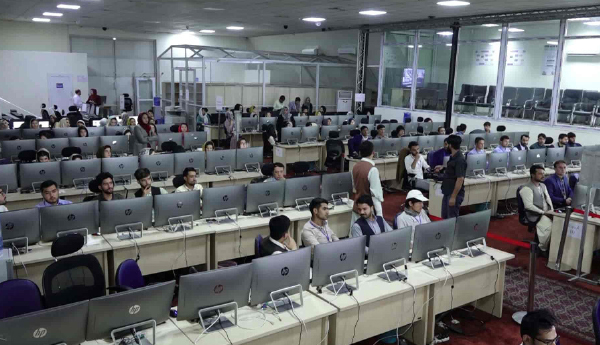KABUL - Independent election observers on Monday blamed the secretariat of the Afghan Election Commission for the technical issues in Saturday’s presidential elections, as well as for not communicating polling information quickly or consistently.
According to the observers, officials from the IEC secretariat failed to share details of the polling centers with the election commissioners and this led to an ‘information gap’ among the IEC members.
“We want them to be accountable as an institution,” said Yousuf Rashid, head of the Free and Fair Election Forum of Afghanistan (FEFA).
Along with failing to reform the list of voters, the IEC commission did not tackle the issue of the biometric systems, Rashid said.
“Workers were assigned who did not have enough experience, and inexperienced people face problems,” said Sayed Jawed Hashimi, an election observer, referring to many reported incidents of problems with the biometric systems.
“From a technical and operational perspective, the secretariat is responsible because the delivery of election materials and other logistical concerns are among their key responsibilities. The leadership of the IEC secretariat has to be accountable both to the IEC leadership and the rest of the secretariat,” said Khalil Raufi, an election observer.
Habiburrahman Nang, head of the IEC secretariat, responded to the allegations: “We are strongly committed to the transparency of the elections.”
But a former IEC secretariat chief says that the reporting on election numbers was too broad and not consistent.
“The secretariat is responsible for gathering all reports and then referring them to the election commission for approval. The secretariat is responsible for sharing the report with the public, too. The numbers that were shared with the nation by the election commission about the level of the participation of the voters was too broad. There were numbers on a provincial level, but, in some cases, they were changed,” said Abdullah Ahmadzai, the former head of the IEC secretariat.
According to Ahmadzai, the IEC secretariat has the responsibility for initiating policies and then referring them to the IEC leadership for approval, however the secretariat failed to do so, which can be considered a violation of principles and of election law.
Election observers had previously accused members of the IEC secretariat of incompetence and warned that this would have grave consequences for the election process. (Tolo News)
Home » Afghanistan » IEC Secretariat Blamed for Technical Problems, Withholding Data
IEC Secretariat Blamed for Technical Problems, Withholding Data

